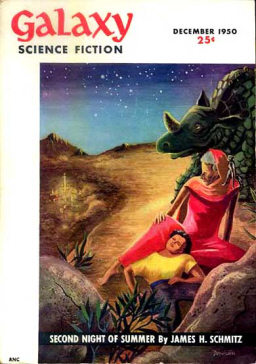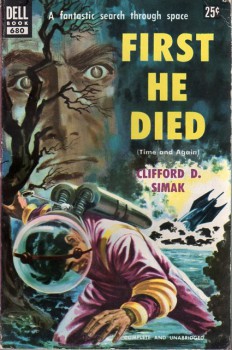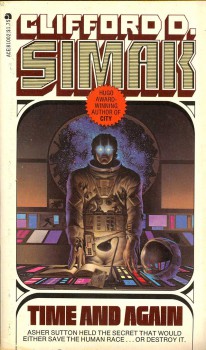Galaxy Science Fiction, December 1950: A Retro-Review
 It is clear from this issue’s editorial that Galaxy was beginning to invade newsstands and draw quite a following. And they were doing it by seeking reader participation in structuring the magazine the way readers wanted it.
It is clear from this issue’s editorial that Galaxy was beginning to invade newsstands and draw quite a following. And they were doing it by seeking reader participation in structuring the magazine the way readers wanted it.
That, and by attracting great writers. In fact, editor H. L. Gold announced that they had raised their pay rates “to the highest in science fiction… We want the best and are prepared to pay for it.” Let’s see how the fiction in this issue shapes up.
“Second Night of Summer” by James H. Schmitz – On the planet Noorhut, Grimp welcomes his grandmother as she makes her annual summer return to the village. Like the rest of the villagers, he’s unaware of a scheduled attack on the planet – one that would wipe out all life as it has on other worlds. Grandma Wannattel is actually an agent sent to thwart the attack, but she can only do so with Grimp’s help; he may be the only one able to sense the precise moment of the attack.
This story hasn’t deteriorated at all over time. It succeeds because it avoids cultural references and stock characters of that time. This was my favorite tale of the issue.
“Judas Ram” by Sam Merwin, Jr. – Roger Tennant lives in a furnished home with a harem of women. Imprisoned by fourth-dimensional beings, Roger and the women are the only humans captured from Earth.
They’re forced to breed through implanted desires, but their minds remain clear; they hate the beings and, to some degree, one another. But there is no choice for them, and the beings train Roger like a dog, teaching him their powers so that he might return to Earth to aid them in capturing others.
I liked the fourth-dimensional aspects of the story, but I couldn’t identify with Roger. I don’t know if it was due to what he had endured through his imprisonment and separation from his wife, but he always felt cold and distant to me. I never felt like there was much beyond his displeasure and fear.
 “Jaywalker” by Ross Rocklynne – Marcia boards a spaceship to the moon using a fake ID. Her husband is the pilot, and she feels that she must confront him after recent arguments in order to save their marriage. But due to her early pregnancy, she puts the entire voyage at risk; unless her husband spins the ship to produce fake gravity through centrifugal force, she will die soon after experiencing the weightlessness of space.
“Jaywalker” by Ross Rocklynne – Marcia boards a spaceship to the moon using a fake ID. Her husband is the pilot, and she feels that she must confront him after recent arguments in order to save their marriage. But due to her early pregnancy, she puts the entire voyage at risk; unless her husband spins the ship to produce fake gravity through centrifugal force, she will die soon after experiencing the weightlessness of space.
Unfortunately, this story doesn’t hold up. Though we’ve never sent a pregnant woman into space, we have sent pregnant rats, and they didn’t die. The concept that prolonged weightlessness (for a matter of a few hours/days) might kill someone is a bit ridiculous. I give the author credit for trying to make it sound plausible, but I think today’s readers would roll their eyes at the notion.
“A Stone and a Spear” by Raymond F. Jones – Curt is one of the top scientists working for the U.S. government within a biological weapons division. He visits his former mentor, Dr. Dell, who left the project in order to run a farm.
Though Dell’s health is in decline, Curt tries to persuade the man to return to the old job. But Dell has an agenda for Curt instead – one that Dell hopes will lead away from the bleak future of biological warfare.
This was a rather somber piece, but I think it summarized a lot of the fears of the Cold War.
“The Waker Dreams” by Richard Matheson – Captain Rackley rushes off to fight against the Rustons – aliens that destroy human machinery, wreaking havoc on civilizations. Aided by an attractive female lieutenant who can counteract the poison the Rustons might infect him with, Rackley readies his ray gun for close combat.
I liked the second-person narrative through part of this story. And I loved the ending – very unexpected.
 “Time Quarry” by Clifford D. Simak – This is the conclusion to Simak’s three-part novel. (I have already reviewed Part 1 and Part 2). Asher Sutton becomes stranded in the late twentieth century, and for a decade, he trains himself on newly-discovered abilities – including telepathy. Afterward, he meets the leader of the Revisionists – those who want to change his book so that mankind becomes the dominant species of the universe.
“Time Quarry” by Clifford D. Simak – This is the conclusion to Simak’s three-part novel. (I have already reviewed Part 1 and Part 2). Asher Sutton becomes stranded in the late twentieth century, and for a decade, he trains himself on newly-discovered abilities – including telepathy. Afterward, he meets the leader of the Revisionists – those who want to change his book so that mankind becomes the dominant species of the universe.
He’s promised vast rewards for his compliance, to the point that even the androids are uncertain which path Sutton will choose. If Sutton sides with the Revisionists, they will have a way to subdue the entire universe, given enough time; if he sides with the androids, he can use his abilities to counteract the Revisionists’ attacks in the time war.
Simak’s novel touched upon a lot of interesting technologies and science-fiction concepts. I was drawn to the story more by the plot than the characters, but it’s not a bad read.
It was eventually republished as Time and Again (1951), and First He Died (1953), and — like many of Simak’s novels — remained in print for several decades.
Read Matt’s review of the second issue of Galaxy here.
I read “Second Night of Summer” for the first time in one of Gardner Dozois’ best anthologies: THE GOOD OLD STUFF. It’s a superb tale — glad you enjoyed it!
These are all reprints? Many of them by dead authors?
Love, C.
Stupid question! I didn’t read the title carefully. 1950 ….
Love, C.
I ran X Minus One’s radio adaptation of Rocklynne’s “JayWalker” here (with a photo of Rocklynne):
http://www.tangentonline.com/old-time-radio/1875-x-minus-one-jaywalker-by-ross-rocklynne
It is very close in theme to Tom Godwin’s classic “The Cold Equations” which appeared four years later in Astounding. That theme being a stowaway forcing the pilot/captain to make a decision that may kill the Many if he saves the One.
And since there’s a Cliff Simak story in this same issue I thought it worth noting as a footnote that both Rocklynne and Simak died in 1988. Cliff was born in 1904 and Rocklynne in 1913.
Dave,
Thanks for the link! That’s really interesting. How many Galaxy stories ended up on X Minus One? I keep seeing more crop up the more I delve into Galaxy. In fact, it was an X Minus One episode (adapted from “Surface Tension” by James Blish) that helped spark my interest in Galaxy to begin with.
I have also bumped into “Second Night of Summer.” It’s fun, unpretentious. Now I wonder where I read it…certainly well worth tracking down.
I could be completely mistaken, but weren’t all the stories on X Minus 1 taken from Galaxy? I’ve heard some of them on the old time radio channel on Siriuis/XM; IIRC, the announcer states that’s where they get the stories.
There was another science fiction radio program that used stories from Astounding; forget the name at the moment. I’ve heard some Heinlein stories dramatized on it.
westkeith – After seeing your post, I looked it up on wikipedia. Apparently, X Minus One was originally partnered with Astounding. Then, at some point, they changed their partnership to Galaxy.
[…] Read Matt’s review of the third issue of Galaxy here. […]
[…] Galaxy Science Fiction, December 1950: A Retro Review […]